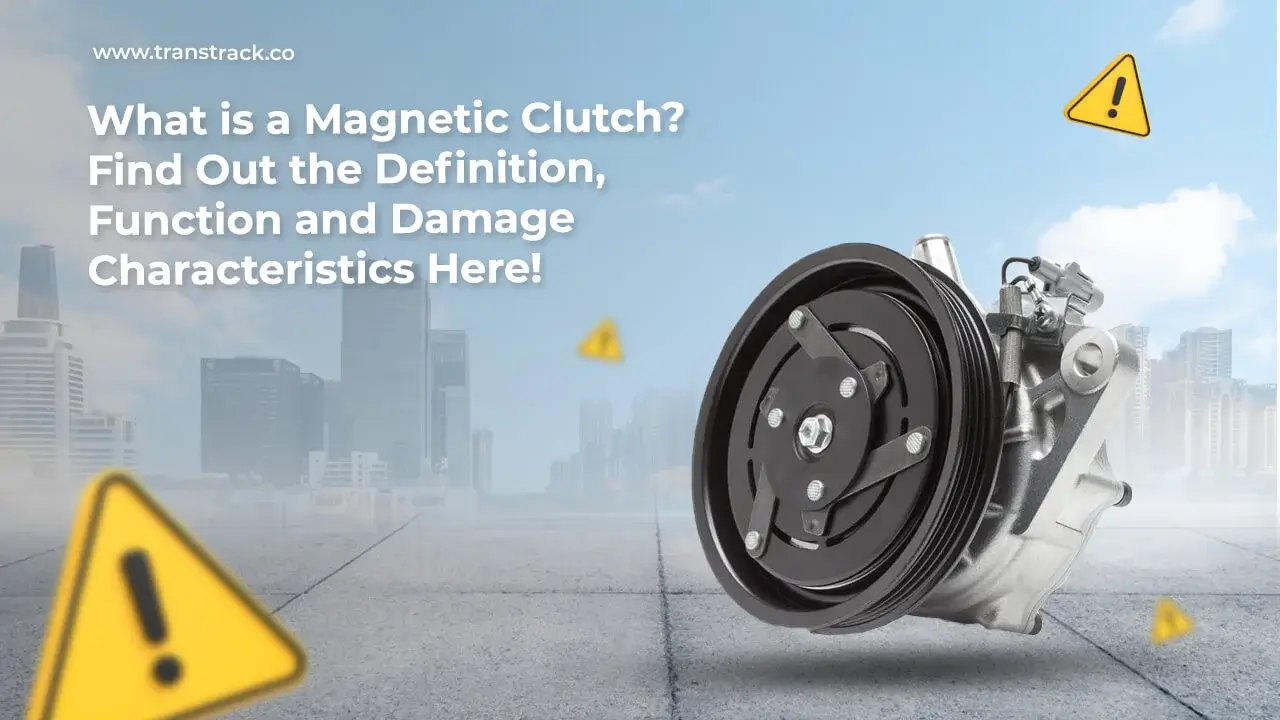What is a Magnetic Clutch? Find Out the Definition, Function and Damage Characteristics Here!

Magnetic clutch is one of the car’s AC components that has an important role. Many vehicle owners may still be unfamiliar with the term magnetic clutch. In fact, this one component plays a very vital role in the performance of the vehicle, especially in controlling the air conditioning system.
Damage to this component will not only make your car feel hot, but will also affect the performance of the engine and other components. One of the questions that may become a question is “How do I know the damage to the magnetic clutch?”. Relax, you don’t need to worry, TransTRACK will discuss this car air conditioning component clearly and in detail.
In this article, you will be invited to discuss the magnetic clutch starting from understanding, characteristics, to the causes of damage.
What is a Magnetic Clutch?
A magnetic clutch is one of the vital components in a car’s air conditioning system. Its main function is to connect and disconnect rotation between the AC compressor drive shaft and the engine drive shaft. In other words, the magnetic clutch acts as a link between the vehicle’s engine and the AC compressor, allowing the driver to control when the AC is turned on or off.
Magnetic Clutch Function
The main function of this car air conditioning component is to provide better control over the air cooling system in the car. When you turn on the AC, the magnetic clutch unites the rotation of the AC compressor with the car’s engine. This allows the compressor to start compressing air and sending it to the cooling system.
In addition, this component of car air conditioning also plays a role in improving fuel efficiency. With the ability to turn off the AC compressor when not needed, drivers can reduce engine load and save fuel. This is especially crucial in situations where the AC is not needed, such as when driving at night with cooler air temperatures.
Characteristics of a Damaged Magnetic Clutch
When this component of the car air conditioner is damaged, there are several characteristics that can indicate the need for repair or replacement. Some common signs of magnetic clutch damage include:
Unusual Sounds
An abnormal rattling, squeaking, or metal scraping sound may indicate a problem with this component of the car air conditioner. This unusual sound may appear when the magnetic clutch is not functioning smoothly or there is friction in its internal components.
Air Conditioner Doesn’t Turn On
Damaged components of this car air conditioner can result in the inability of the AC compressor to rotate properly. This will cause the AC to be unable to produce cold air even when the AC unit is activated.
Increased Fuel Consumption
Damage to this component of the car air conditioner can also cause excessive load on the car engine. Even when the air conditioner is turned off, a faulty magnetic clutch may still overload the engine, resulting in a significant increase in fuel consumption.
Unusual Vibrations
Over time, wear and tear or damage to these car air conditioning components can cause abnormal vibrations in the system. These vibrations can be felt on the gas pedal or steering wheel when the AC is turned on.
Excessive Heat
Damage to this component of the car air conditioner can increase the surrounding temperature to feel hotter than usual. A significant increase in temperature can result in overheating of the engine, which can eventually damage other components.
AC Indicator on Dashboard
Some cars are equipped with special indicators that show problems with the air conditioning system. If this indicator lights up or flashes, it could be a sign that this or another part of the air conditioning system is failing.
Causes of Magnetic Clutch Damage
A number of factors can cause damage to this car air conditioning component. Some of them are:
Intensive Use
This component of the car air conditioner works hard when the air conditioner is activated. If the vehicle is used too often or in extreme temperature conditions on a continuous basis, the magnetic clutch may wear faster and cause damage.
Contamination
Contamination can damage the internal components of the magnetic clutch. Dust, dirt, or other particles that enter the air conditioning system can cause excessive friction or wear on critical parts, resulting in damage.
Poor AC Oil Quality
AC oil plays an important role in the lubrication and cooling of the car’s AC components. The use of inappropriate or low-quality oil can cause excessive friction and decreased performance of the car’s AC components.
Service Life
The service life or age of the car AC component parts that have been used for too long can cause damage. Although these car air conditioning components are designed to last a long time, normal wear and tear still occurs with use. This factor can cause damage as the vehicle ages.
Electrical Problems
The last cause that has the potential to cause damage to the car’s AC component is a disturbance in the car’s electrical system. Conditions such as a short circuit or unstable electrical voltage can damage the electrical components in this car AC component. This can affect the clutch’s ability to function properly.
By understanding what a magnetic clutch is, its functions, characteristics and causes of damage, you can be more proactive in maintaining the health of the air cooling system in your car. Avoid ignoring signs of damage and always perform regular maintenance to maintain the optimal performance of your vehicle.
To make vehicle monitoring and maintenance easier, you can utilize Vehicle Maintenance System (VMS) technology from TransTRACK. By using the Vehicle Maintenance System, you can efficiently track maintenance schedules, get notifications for necessary component replacements, and overall increase the lifespan of your vehicle.
Hopefully, this article has provided a deeper understanding of the magnetic clutch in cars. Stay proactive in maintaining your vehicle, and enjoy a comfortable and efficient AC driving experience!
Topic





